Tanzânia Safari Essencial
Um safári especial para famílias e amigos
Percorrer as trilhas dos parques da Tanzânia em busca da vida selvagem africana é tão agradável quando se pode fazer isso em família ou entre amigos. Este itinerário é realmente adequado para pequenos grupos que desejam viver uma viagem magnífica em 9 dias no local. Aqui, propomos o essencial.
Trip Description
Accomodation
Stay program
day 1
Aeroporto do Kilimanjaro - Parque Nacional de Mkomazi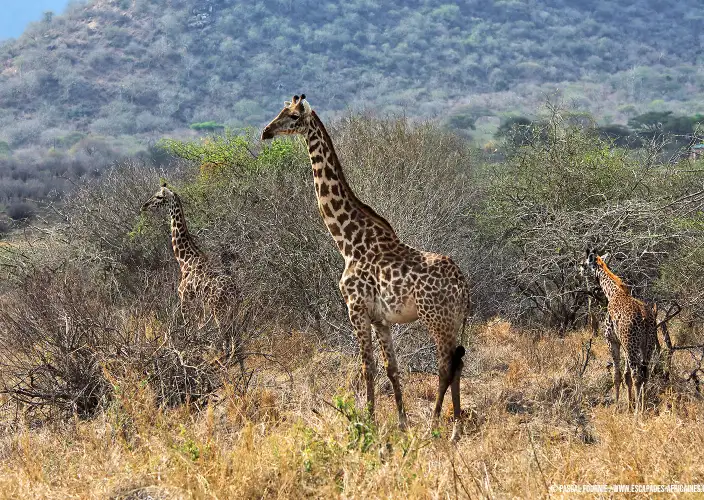
Após o seu primeiro encontro com o seu motorista-guia na saída do aeroporto, você seguirá para o Parque Nacional de Mkomazi, muito pouco visitado. E, no entanto, para começar um safári, é provavelmente uma excelente introdução. Uma vez chegados ao parque, você fará o seu primeiro safári em direção ao acampamento de tendas que o receberá calorosamente. Noite no Mkomazi View Camp.
day 2
Parque Nacional de Mkomazi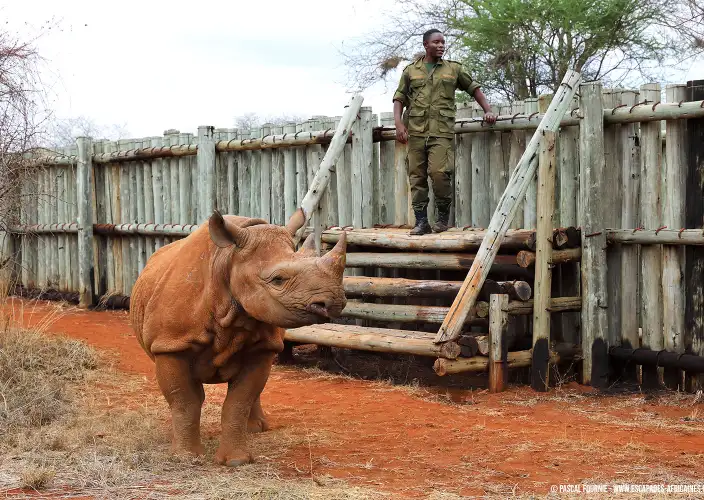
Dia completo de safári e descoberta do santuário dos rinocerontes, este é um programa que lhe permitirá fazer belas observações em um parque nacional que outrora foi uma reserva de caça. Isso explica por que, às vezes, os animais mantêm uma certa distância. Mas fique tranquilo, os grandes mamíferos, como elefantes e girafas, lhe proporcionarão grandes emoções, pois serão os primeiros animais do seu safári. Em Mkomazi, você descobrirá búfalos, zebras, órix, pequenos kudus, dik-diks e uma infinidade de aves de todos os tamanhos. O santuário dos rinocerontes Acompanhado por um guia especializado e a bordo de um 4x4 preparado para off-road, você irá ao encontro de alguns rinocerontes negros do santuário, que tem como missão proteger esses animais perseguidos por causa de seu chifre. Você provavelmente encontrará Kisima, que ficou órfã aos 3 meses de idade, depois o macho Jabu, ou ainda Tunu e sua filha Waitara. Este será para você um dos momentos mais marcantes desta estadia na Tanzânia. Piquenique ao meio-dia, jantar e pernoite no Mkomazi View Camp.
day 3
Parque Nacional de Arusha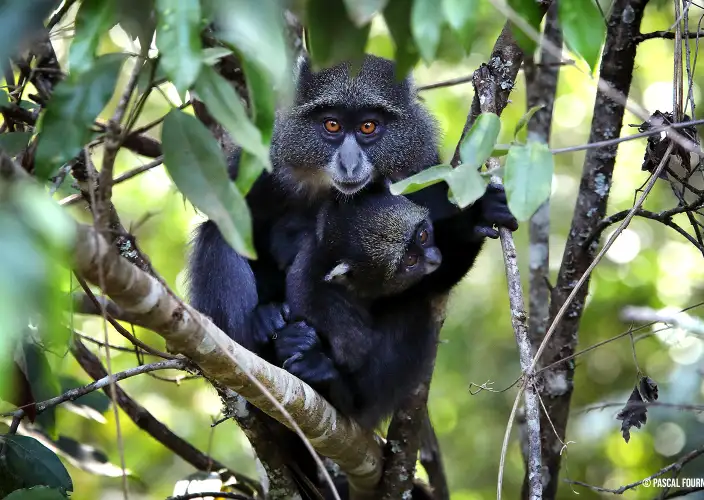
Acordar cedo para deixar Mkomazi após o seu café da manhã. Direção ao Parque Nacional de Arusha, que também é geralmente deixado de fora dos circuitos turísticos. No entanto, lá se descobre uma fauna que não se vê ou se vê pouco em outros lugares. Além disso, a paisagem é magnífica, especialmente com a vista do Monte Meru, que atinge 4.566 metros. O Parque Nacional de Arusha possui uma vegetação por vezes densa, onde se admiram numerosas espécies de árvores, plantas, flores e, portanto, de aves e insetos, incluindo algumas borboletas de grande beleza. Mas aqui, os lagos de Momella acolhem muitas aves, incluindo as duas espécies de flamingos (rosa e anão), íbis-sagrados, íbis-falcinelos, tantalos africanos, pernilongos e muitos outros... Entre os primatas, espere cruzar o olhar do macaco azul (cercopiteco-de-diademas) e dos colobos guereza, mesmo que estes últimos permaneçam indiferentes à sua presença! Por fim, zebras, búfalos, girafas e facoceros são os mamíferos mais frequentes. Piquenique ao meio-dia, jantar e pernoite no African View Lodge, situado a poucos minutos do parque nacional.
day 4
Arusha - Mto wa Mbu
É para a descoberta da pequena cidade de Mto wa Mbu que o convidamos hoje. Aqui, o ambiente é particularmente acolhedor, a população sorridente e várias atividades podem ser organizadas. Entre os imperdíveis, o encontro com os escultores Makonde. Vindos de Moçambique, esses artesãos da madeira fabricam esculturas com ferramentas manuais muito rudimentares. Em seguida, propomos que descubra os pintores Tingatinga, nome do artista tanzaniano que lançou este movimento artístico em 1968. Ao meio-dia, você almoçará na casa da Mama Gift, que preparará uma refeição tipicamente tanzaniana para você. Jantar e noite no Fig Tree Hotel.
day 5
Parque Nacional de Manyara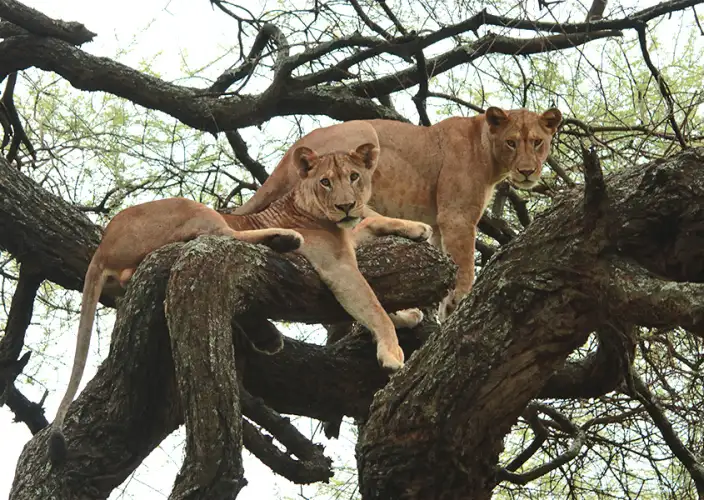
Você passará o dia no Parque Nacional de Manyara, cuja entrada está localizada próxima a Mto wa Mbu. Ao entrar no parque por uma floresta exuberante, talvez você tenha a sorte de observar os cercopitecos-de-diademas (macaco) e os calaus-de-bochecha-prateada (aves). Além dos elefantes, frequentes neste ambiente, grupos de babuínos compostos por várias dezenas de indivíduos compartilharão com você alguns momentos de seu cotidiano: catação, alimentação, descanso e, às vezes, algumas rivalidades internas. Nos últimos anos, o nível do lago aumentou e a área dos territórios de algumas espécies diminuiu. Alguns animais, portanto, deixaram Manyara para se juntar a Tarangire. No entanto, ainda há animais suficientes para satisfazer os apaixonados por safári. Entre outros, os leões que às vezes podem ser vistos empoleirados em uma árvore! Não é garantido, mas é totalmente possível. Em Manyara, a diversidade ornitológica depende da época do ano. Ombrette, jacana, abibe-armado, abibe-coroado, socó-cabeludo, garça-ardósia, pernilongo, íbis-de-face-preta, íbis-sagrado, pelicano-branco, ganso-do-egito, combatente... a lista continua! A este festival juntam-se ainda alguns herbívoros como os búfalos. Piquenique ao meio-dia. Jantar e pernoite no Fig Tree Hotel.
day 6
Mto wa Mbu - Parque Nacional de Tarangire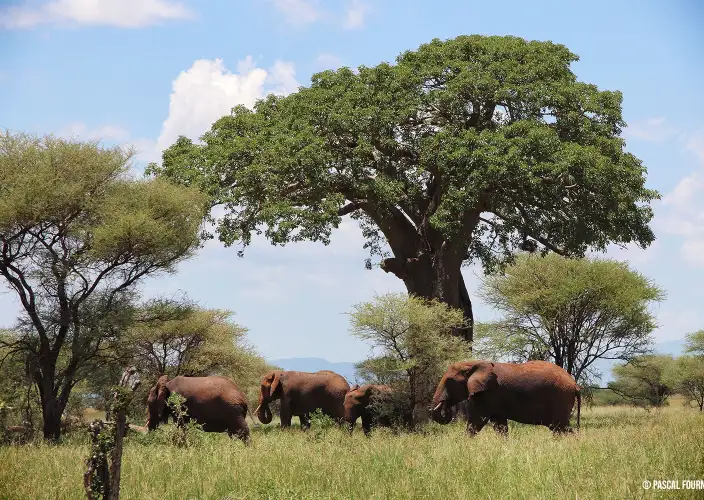
À sua chegada no final da manhã, você deixará sua bagagem no local de hospedagem e partirá para descobrir a fauna deste parque, cuja vegetação é frequentemente dominada pelos numerosos baobás. Você percorrerá lentamente as trilhas em busca de manadas de elefantes, girafas, gazelas, antílopes e predadores. Os amantes de pássaros terão todo o tempo para fazer belas observações com binóculos. A natureza em Tarangire Paisagem totalmente diferente dos outros parques do norte, você descobrirá, em uma importante rede de trilhas, as numerosas espécies que habitam Tarangire, em particular os elefantes que podem formar agrupamentos de dezenas de famílias, representando às vezes uma reunião de mais de 300 indivíduos. Nas áreas de pântano, as espécies de aves são muito numerosas e agradarão aos ornitólogos, enquanto os cupinzeiros desativados são frequentemente o refúgio dos mangustos-anões e o mirante dos barbudos-de-cabeça-vermelha. Tarangire também é típico por seus baobás. Jantar e noite no Tarangire View Camp.
day 7
Parque Nacional de Tarangire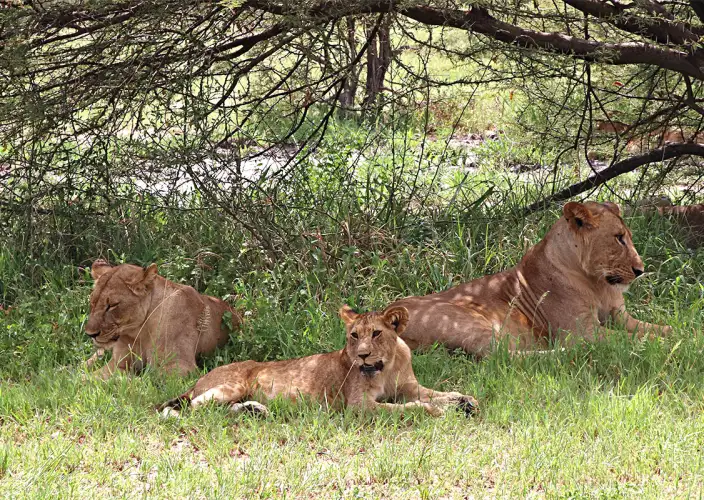
Após o café da manhã, você partirá para um dia inteiro de safári com um piquenique a bordo do seu 4x4. No programa: a busca por elefantes, leões, guepardos e leopardos. Quanto aos elefantes e babuínos, sua vida social permitirá que você assista a cenas às vezes surpreendentes. A busca por animais Mesmo que muitas espécies de animais sejam fáceis de encontrar, outras exigem mais atenção e às vezes um pouco de sorte. É o caso de muitos carnívoros. Leões, guepardos e leopardos costumam ser discretos. Descobrir um desses felinos é sempre um momento de intensa satisfação, mas às vezes obtemos informações ao cruzar com outros 4x4. Nesse caso, nos dirigimos para o setor onde eles estão presentes. É importante notar que usamos o rádio apenas em caso de necessidade e não para obter a posição exata dos animais. O barulho incessante das comunicações de rádio rapidamente se torna insuportável e tira todo o charme do safári. Jantar e noite no Tarangire View Camp
day 8
Parque Nacional de Tarangire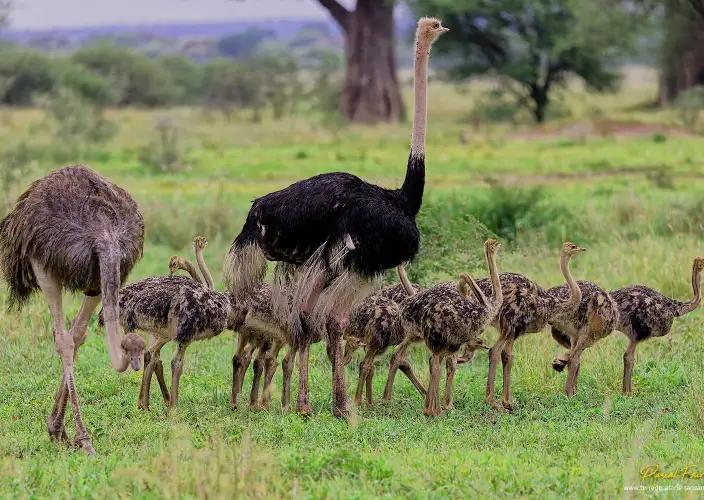
Para este segundo dia completo de safári em Tarangire, você percorrerá o setor chamado de "pequeno Serengeti". Aqui, os bandos de búfalos são frequentes, com um número de indivíduos que às vezes ultrapassa mil. É também uma área apreciada pelas avestruzes. Mais adiante, e dependendo da estação, os baobás podem estar floridos, com folhas ou totalmente despidos. Em todos os casos, a presença dos elefantes ao lado dessas árvores gigantes é um espetáculo impressionante. Destaques de Tarangire • Famílias de elefantes • Vários clãs de leões • Guepardos regularmente observados • Presença de leopardos para serem avistados nas árvores • Grandes bandos de búfalos • Aves com mais de 550 espécies Você retornará ao Tarangire View Camp no final do dia para um jantar e a última noite na savana africana.
day 9
Tarangire - Arusha - Aeroporto do KilimanjaroPartida no início da manhã para Arusha, onde você fará uma parada para o almoço no Tembo Club. Em seguida, traslado para o aeroporto em caso de voo no final do dia.
- Duration : 9 days
- Price : From €2,025 per person
- Destinations: : Tanzânia
A website by
Customize your trips with Quotatrip and receive tailor-made offers directly in your inbox.